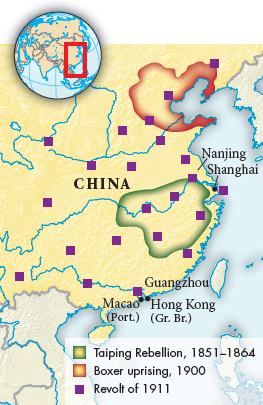Internal Problems

China’s problems in the nineteenth century were not all of foreign origin. By 1850 China had a population of more than 400 million. As the population grew, farm size shrank, surplus labor suppressed wages, and conflicts over rights to water and tenancy increased. Hard times also led to increased female infanticide, as families felt that they could not afford to raise more than two or three children and saw sons as necessities.
These economic and demographic circumstances led to some of the most destructive rebellions in China’s history. The worst was the Taiping Rebellion (1851–
The Taiping (TIGH-
By 1853 the Taiping rebels, as Hong’s followers were known, had moved north and established their capital at the major city of Nanjing, which they held onto for a decade. There, they set about creating a utopian society based on the equalization of landholdings and the equality of men and women. To suppress the Taipings, the Manchus had to turn to Chinese scholar-